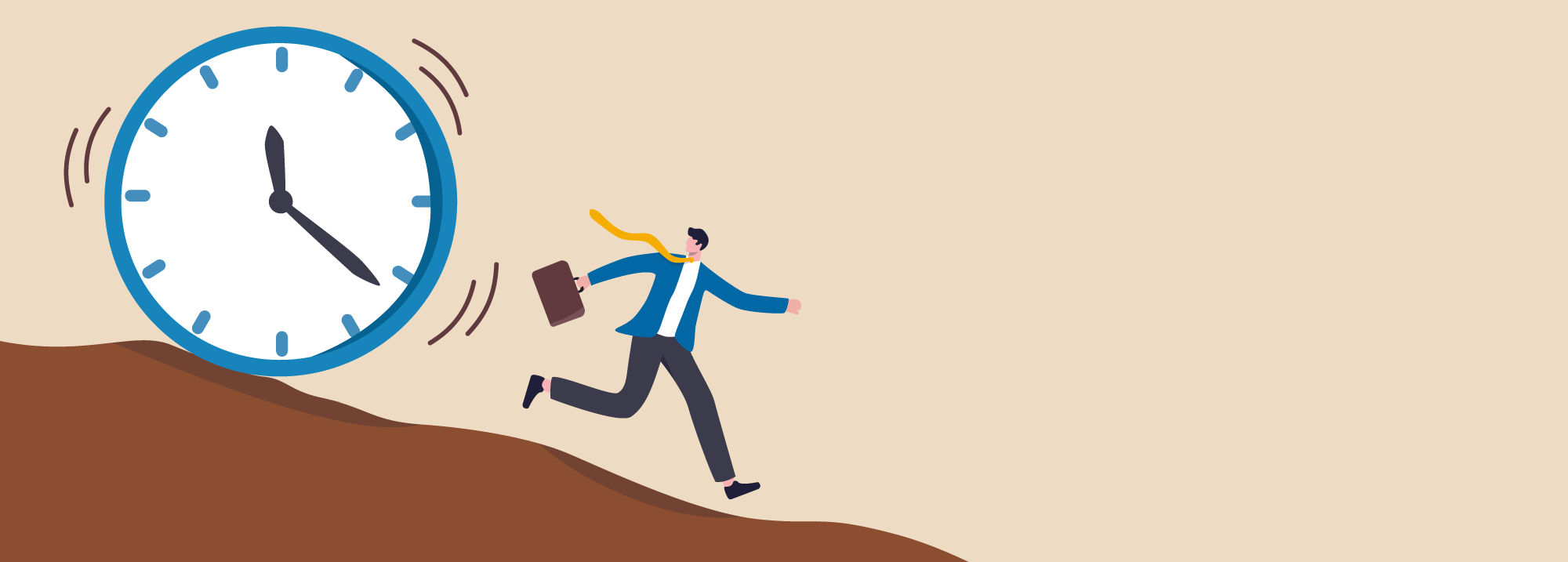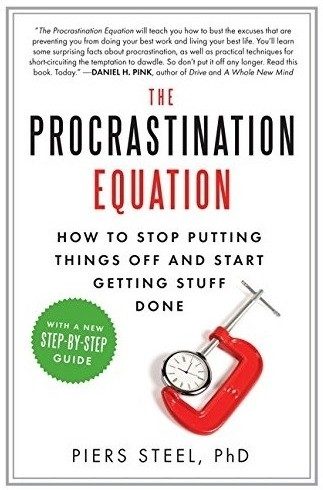Procrastination, i.e. the habit of postponing things you don’t want to do, is something almost everyone is familiar with and is increasingly becoming a social problem due to the lure of the electronic media. Why are we so keen on putting things off? And what can we do to regain control of our daily lives? Behavioural researcher and author Piers Steel provides answers.
Why does a behavioural scientist address the subject of procrastination?
As they say; “Research is mesearch”. I was a terrible waverer. This often gave rise to conflicts, my performance deteriorated considerably, and I suffered as a result. I wanted to understand why I act like this.
Isn’t this behaviour completely normal? Doesn’t everyone like to out off unpleasant tasks until the next day?
Sporadic postponement is unproblematic and normal. Over 95 percent of people say they occasionally put off important things. Chronic procrastination is only an issue when it becomes a permanent problem with negative consequences for a person’s well-being and their own success. Those affected are no longer able to switch off properly, may experience disrupted sleep patterns, self-doubt or even depression.
Isn’t procrastination just a more sophisticated term for laziness?
No. Lazy people don’t want to work. Procrastinators want to move forward, but they don’t manage it. They postpone important tasks, even though they know they are harming themselves with this decision. So when we postpone, we knowingly act against our own interests. Seen in this way, procrastination is a harmful failure of self-regulation and a loss of self-determination. These people are no longer able to decide for themselves when to do something, but they let the environment decide by letting themselves be distracted. They lose control and autonomy over their lives.

Why do we procrastinate if we harm ourselves in doing so?
According to research, different personality traits contribute to this. For example, lack of self-confidence or a tendency to get bored quickly. The biggest Achilles heel of procrastinators, however, is their impulsiveness, i.e. the need to want everything here and now. Impulsive people have difficulty with self-control and want their needs to be satisfied immediately. It is hard for them to do something now that they will not be rewarded for until later. As a result, they tend to bypass or suppress the burdensome task and be easily distracted.
Is procrastination a modern phenomenon?
No, the problem of postponing deadlines was already addressed by the ancient Egyptians and the ancient Greeks in connection with sowing and harvesting. But today we live in the “golden age of procrastination.” According to studies, in the 1970s, 5 to 7 percent of people were chronic postponers, in 2010 it was already around 20 percent and today it is even around 30 percent.
Why this immense increase?
Because we live in a world of perfect temptation. “It’s like trying to diet in a candy store” The distractions and temptations have never been as varied and as readily available as they are today. After TV and video games came the internet and finally the smartphone. We always have it with us and via Tiktok, Instagram or Youtube it provides us with content that is tailored to our interests and that seems to give us immediate satisfaction. And this is toxic for our motivation to tackle tasks that are less enjoyable and require more stamina. This also has to do with our brains.

What does our brain have to do with procrastination?
Neurobiologically, two areas of our brain are engaged in a duel. The prefrontal cortex controls planning and problem solving. And the limbic system wants instant gratification. So we postpone things when the limbic system vetoes the long-term plans of the prefrontal cortex and votes for immediate action. Not only is the limbic system faster and determines our initial reaction, but it is also often stronger.
Which things do we put off most often?
It’s highly individual. Some people put off cleaning; others clean in order to postpone something else. Things that are particularly likely to be postponed include, in addition to school and work, activities that affect our health, such as sports, diets or medical check-ups. Financial matters such as paying your bills, completing your tax return or saving for old age are also classics – a particularly illustrative example of procrastination.
In what sense?
A young person saving for a private pension is unlikely to find any direct satisfaction in this. Our internal reward centre is bored. Because the point in time when we benefit from it is very far off. Moreover, young people are generally more likely to suffer from procrastination than older people. This is fatal for retirement provisions, as those who just put off and avoid are passing up precious years. Studies also show that chronic procrastinators are not only worse off financially, they are also less healthy and happy. In addition to harming themselves, they also cause enormous economic costs.
Can the economic costs of procrastination be quantified?
This is difficult. A US study conducted in 2010 found that employees spend an average of more than two hours a day doing nothing, excluding lunch breaks. As a result, the US economy lost more than $ 1.2 trillion in 2010. Today it is probably many times that. And if we add to that the inability to save money or to make timely medical examinations, the overall cost to society is much higher.
As a professed procrastinator, you have made it and become an internationally renowned professor. So there’s a way out of this vicious circle of daily procrastination?
The good news is: we tend to procrastinate, but we are not doomed to do so. No matter why we delay – because we lack self-confidence, because we dislike our work, or because we act impulsively – we can do something about it. To do so, we need to recognise our weakness and apply techniques that are suitable and helpful to us (see below, editor’s note). But beware: not every postponement is unreasonable. We need those moments where we let it slide, switch off and pamper ourselves. It is crucial to find the right balance.
What can you do against procrastination? 6 tips from Piers Steel


1. Forgive yourself
If you feel guilty because of your weak will, you do nothing about it. Admit it and forgive yourself. Studies have shown that students who delayed studying for an examination and then forgave themselves are less likely to delay on subsequent examinations.
2. Protect yourself from distractions
The American novelist Herman Melville allegedly let his wife chain him to a desk while writing his novel “Moby Dick” to keep him from distracting himself. You don’t have to be that radical. But find out your personal temptations and keep them out of reach. Delete the games on your computer, disconnect the Internet, switch your phone to flight mode or unplug the TV.
3. Take care of your energy and use the right time
A major reason for procrastination is lack of energy. Get enough sleep, eat well and keep fit. And find out what time of day you have the most energy. This is when you should do the most difficult tasks. The majority of us only reach our maximum energy level for four or five hours a day. For the majority, this is between 9 a.m. and 2 p.m.
4. Do the hard things first
Mark Twain once said: “If it’s your job to eat a frog, it’s best to do it first thing in the morning. And if it’s your job to eat two frogs, eat the bigger one first.” One way to postpone less is to get the most difficult and important projects done first. The more demanding the tasks, the more energy and concentration we need to get them done.
5. Divide large tasks into small tasks
Effective targeting is a key element in the fight against procrastination. How do you eat an elephant? Piece by piece. And that’s the way it is with big tasks. Divide them into smaller, more accessible mini-goals. The more specific and closer the deadline, the better. By reaching the small goals, your brain will reward you with a higher expectation of success, so you will be better able to overcome the procrastination.
6. Acquire habits
Since we humans are creatures of habit, it helps to acquire a routine. Whether it’s personal bookkeeping, fitness training or writing a paper for a class: try to do things regularly and always at the same time. After just two months it will become routine. Then you’ll do them without thinking.

Piers Steel
Piers Steel is a behavioural scientist and teaches organisational behaviour and personal development at the University of Calgary in Canada. He is one of the leading experts in procrastination research and has written a standard work on the subject with the book “Der Zauderberg” (Lübbe Verlag). His research has been published in a number of journals, including Psychology Today, “New Scientist” and The New Yorker. He lives near Calgary, is married and has two sons.





